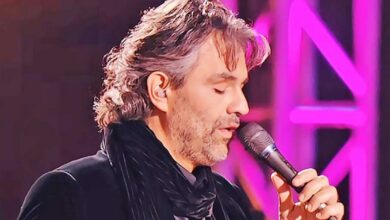Elvis’s Song, Sung by Bocelli, Often Brings Tears
Andrea Bocelli’s interpretation of “Can’t Help Falling In Love” serves as a masterful homage to the legendary Elvis Presley, embodying both the essence of the original and a personal touch that resonates with his audience. In his rendition, Bocelli elevates the song with his remarkable operatic voice, breathing new life into this classic ballad that has stood the test of time. Accompanied by the proficiency of renowned pianist David Foster, the performance transcends a simple cover, transforming into a profound musical experience that captures the hearts of listeners around the globe.
The allure of Bocelli’s performance lies not only in his vocal ability but also in the deep emotional resonance he brings to the piece. The sincerity of his delivery invites the audience to connect with the song on a personal level, allowing them to feel the very sentiments that intended by the original writers. Each note delivered feels deliberate yet organic, reflecting Bocelli’s unique blend of emotional authenticity and technical prowess that has defined his extensive career. His interpretations evoke a range of emotions, often moving audiences to tears, showcasing a talent that not only entertains but also uplifts the human spirit.
Before rising to acclaim, Bocelli spent years cultivating his talent in intimate settings, performing in local piano bars throughout Italy. It was here, amid the warm atmosphere and close-knit audiences, that he first encountered Presley’s iconic works. His familiarity with “Can’t Help Falling In Love,” as well as other timeless classics, significantly shaped his artistic identity. Tesla’s influence on Bocelli is not merely confined to one song, but spans a myriad of styles and genres that the tenor weaves effortlessly into his own repertoire, all the while embodying the spirit of the original composers.
Born in the idyllic town of Lajatico in Tuscany, Andrea Bocelli’s journey into the world of music has been nothing short of extraordinary. His early years were marked by a combination of challenges and triumphs, including a life-altering accident that temporarily hindered his ability to sing. However, his resilience and unwavering passion for music led to a series of breakthroughs, including a fateful audition with the famed Italian singer Zucchero. This event would ultimately propel him into a collaborative endeavor with the legendary Luciano Pavarotti—an opportunity that not only launched his career but also embedded him deeply within the annals of opera and popular music.
Over the years, Bocelli has released an impressive catalog of work, encompassing various musical styles and genres. His ability to seamlessly blend classical and pop elements has garnered him more than 90 million record sales worldwide, cementing his status as a global icon. His collections often feature operatic arias alongside contemporary ballads, demonstrating an artistic versatility that has captivated audiences of all ages and backgrounds. “Sacred Arias,” one of his celebrated albums, remains the best-selling classical album to date, highlighting his broad appeal and exceptional talent.
Bocelli’s collaborations have further enriched his musical journey, most notably his celebrated duet with Celine Dion in “The Prayer,” which has won numerous accolades and touched countless hearts. These partnerships not only showcase his vocal range but also his ability to meld his style with that of other artists, resulting in harmonies that underline the rich tapestry of human emotion. Whether singing alongside fellow opera singers or pop stars, Bocelli’s artistry shines through, earning him a revered place within the hearts of music lovers across the spectrum.
The origin of “Can’t Help Falling In Love” adds another layer of significance to Bocelli’s rendition. Written for the 1961 film “Blue Hawaii,” the song’s melody is rooted in “Plaisir d’amour,” a classic French love song, illustrating its timeless appeal. Over the decades, countless interpreters have rendered their versions, yet Bocelli’s interpretation stands out for its ceremonial homage to the song’s legacy while breathing contemporary sensibilities into it. His version capitalizes on an operatic aesthetic, infusing the melody with depth and warmth that resonates under the soft messaging of love and desire in the lyrical narrative.
Bocelli continues to enchant audiences worldwide through his live performances, which are celebrated for their ability to convey profound emotions. He possesses an innate gift for honing in on the emotional core of a song, allowing him to share a unique intimacy with his audience. His performance of “Can’t Help Falling In Love” not only highlights his vocal mastery but also acts as a testament to his understanding of music as a universal language—one that speaks directly to the human experience.
As Bocelli explores new musical avenues, his legacy as an artist and cultural ambassador remains firmly established. He continually seeks to push boundaries while honoring the traditions that have shaped his understanding of music. The heartfelt nature of his performances and the sincerity of his interpretations ensure that each concert becomes an unforgettable event, weaving a rich narrative through the fabric of song.
Visiting one of Bocelli’s future concerts promises to be an emotional journey—one that showcases not just his remarkable talents but also the power of music to connect individuals across vast distances and diverse backgrounds. Each note sung, including his rendition of “Can’t Help Falling In Love,” invites listeners to partake in a shared experience, celebrating love, longing, and the timeless nature of a melody crafted by gifted hands before him. In this way, Bocelli’s performances are more than mere entertainment—they are invitations to witness the beauty of life itself, expressed through the universal language of song.
&ab_channel=AndreaBocelliVEVO





